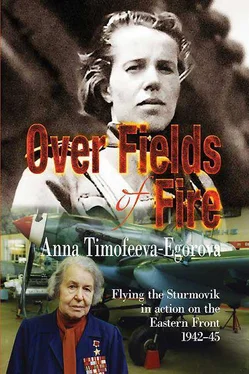By dawn, with frostbitten faces and hands, we had come across our soldiers. They were artillerymen from the unit to which I and Frontline Artillery Commander Zhouk were flying. They walked us into a hut wherein an iron stove was burning and soldiers were sleeping all over the floor. I fell asleep as soon as I sat down by the threshold. In the morning the signalmen reported my location to my squadron, and mentioned that the plane needed serious repairs. Soon after that Spirin, the pilot, flew over to me with Dronov the mechanic and on a second trip he brought all the stuff necessary for repairs to the engine and plane.
It had taken the whole day to find the plane in an unknown forest (fortunately, a big patch of spilled oil on the snow had helped out) and tow it by horse to a village. Konstantin Sergeevich swore for quite a while examining the damaged plane. He wished a thousand damnations on the German flyers and on Hitler himself, promising to bury the Führer on an aspen stake. But at the same time he went about his business, quickly installing something like a tent over the engine to protect himself from the wind.
When I saw that for ease of working he’d taken off his gloves I began to assist him.
“Comrade Commander, what are you trying to do with the engine with such a frostbitten face, eh? It’ll get scared and won’t start”, my mechanic joked. Indeed my face was scary: it had turned black all over. I daubed it with grease and on top of that put on a mask of mole-fur. Such masks had been issued to all airmen but we didn’t like to wear them — the furry skin on its lining with cutouts for the eyes and mouth made us look as if we were at a carnival.
To send me off to warm up Dronov was inventing various ruses but then he gave up and the whole business went faster. Aircraftsmen are an amazing lot! As a rule they are great masters of their craft or as it is said now, ‘craftsman with golden hands’. They wouldn’t go to eat or sleep until a plane was fully ready and then, having handed it over to a pilot, wouldn’t leave the aerodrome but would patiently wait for his return. He would begin to tidy up the parking lot — he would roll up the aircraft covers, carry brake shoes to the right place, then would simply smoke so the waiting time didn’t drag on so long. And he would cast glances at the sky time and again — is he coming back yet? A mechanic would recognise the approach of his plane from afar — by a note in the engine’s roar known only to him. And then he would run to meet it! How happy these modest aerodrome labourers were when their pilots came back to the ground alive and in one piece. And there would be no limit to their grief if their pilots had not come back from a mission… No, I could not have become a plane mechanic — I wouldn’t have had the strength to wait! Especially at war when all possible time for return is up and all hope rests on a miracle but the mechanic still waits, peers into the sky, listens, hopes…
That time Dronov came back to the squadron with me and he showed his comrades the holes he had had to patch up in the frost.
“I counted 87 holes but Annoushka and the General weren’t scratched! That’s what it means to have the ‘devil’s dozen’ as your tail number”, Dronov chuckled. But I knew: apart from all the numbers, apart from luck, on those flights I’d been faithfully guarded by the hands of my mechanic. And by fate as well. I do believe in fate.
Generally speaking everything had turned out alright except that we’d got our fingers and cheeks frostbitten. But who would pay attention to that at the front? It was a trifle not worth remembering! But the Artillery Commander couldn’t forget that night on the steppe and he remembered my personality. As soon as he’d flown back to Front headquarters he notified the signals commander Korolev: “I’m taking Egorova. I need combat pilots for the spotter planes…”
When it became known in the squadron the airmen began ‘making me see reason’: “Have you gone crazy? You’re a pilot, a human being, not a rubber balloon. You’re meant to fly, not to hang like a sitting duck over the frontline!”
That was true — it’s not too pleasant to serve as a target. But, word of honour, in what way were we, in our U-2s, not targets for the enemy’s fighter planes? And I’d grown sick of being an aerial chauffeur… I wanted to fight a real war. At least the spotter plane pilots helped to detect the enemy and wipe him out, but what about us? But nevertheless if I were to switch to another kind of aviation I would prefer to be a ground-attack pilot. I wasn’t destined to become a spotter plane pilot…
Missions, missions. There seemed to be no end of them. The squadron was manned by ‘Spanish’ pilots but they were shoving me — a girl — into the most difficult holes. It was an unpleasant sensation.
“Egorova, you will be flying in search of the Katyushas !” 84 84 Editor’s note — here, a nickname for M-13 truck-mounted rocket missile launch systems.
And again I would answer: “Yes sir, flying out!”
The Katyushas had just arrived at our Front and it had significantly raised our previously depressed spirits. I was given an approximate area and told that they were big trucks with installations for rockets. They would have slip-covers on top. I was also ordered to hand over to General Pushkin — a Corps Commander — a top secret package.
The thaw was on. It was raining in the area of our aerodrome. Visibility was at its lowest — about a hundred metres. When I had flown away from the aerodrome a wet snowfall began and fog overcast everything around — I couldn’t see a thing! I decided to increase altitude: maybe up there it would be a bit clearer than near the ground. The altimeter was already indicating 900 metres and indeed the fog had thinned out — but what was that? The plane began to shudder. All its cross-braces began to vibrate. I glanced overboard and saw the wings, the fuselage, even the propeller covered with a smooth icy crust.
The engine was working, all rudders and elevators were functioning but the plane wouldn’t obey them, it was losing altitude. I pushed the control column away to lose altitude faster but soon some instinct warned me that the ground was already close — somewhere very close. What’s down there, below me? A house, a forest, a river, a gully or something else? I turned off the engine and slowly pulled the lever… Bang! The plane touched the ground and carried us off, dragged us somewhere. I did my best to slow down, to stop our movement. But there were no brakes on the U-2 and I was using the rudder.
At last the plane stopped and it became astonishingly quiet. Nothing could be seen two steps away — there was fog and I was afraid to walk away from the plane — I could get lost. I had to wait until the fog dispersed. In the meantime I cleaned the ice from my plane and determined my location approximately, based on the time and flight speed. And when it had grown lighter I saw a large haystack in front of the plane’s nose. How had I managed not to run into it?
Having taken off I managed anyway to find General Pushkin’s Corps with the Katyushas . But on my way back I ran into a heavy snowfall again. I landed the machine by now in pitch-darkness — not even the plane parking bays were visible, so after touch down I taxied ‘on a wing and a prayer’. It was a good thing Dronov the mechanic had heard the ‘voice’ of his plane and run to meet me.
The squadron commander gave me a long dressing down then: “Tired of living, are you?” The pilots maintained a gloomy silence: it appeared that they had turned back half-way without completing their missions. The Southern Front Signals Commander General Korolev declared his gratitude to me and the political department presented me with a gift — a parcel from the home front. The most interesting moment was that on opening the parcel I found a tobacco pouch on top. “To a dear soldier from Marousya Koudryavtseva — as a keepsake” was embroidered on the pouch and inside there was a photo of a pretty girl. In her letter Marousya asked the young combatant to give the Fascists a real good bashing and come back home soon and victorious. And there was so much in that parcel carefully laid out under the tobacco pouch! Tobacco in packages, a bottle of vodka wrapped in woolen socks and, wrapped in a towel with red embroidery, a small bag of dried fruits. At the very bottom of the box there was a school exercise-book and a dozen envelopes. Half of them bore the address: Town of Mary, Turkmenskaya SSR 85 85 Translator’s note — a Soviet Republic in Central Asia, now Turkmenistan.
, Maria Koudryavsteva. I gave the pouch, the tobacco and the bottle of vodka to my aircraftsman, the towel to the hostess of the house I lived in, and kept the woollen socks and dried fruits for myself. I decided to pass the photo, the writing-book and the envelopes to Victor Kravtsov — a well-built Kuban Cossack who was 22 years old. I remember that in whatever place we were located all the local girls couldn’t take their eyes off him, but the Cossack wouldn’t pay attention to any of them… However, maybe he was only pretending that he was indifferent to them all?
Читать дальше












